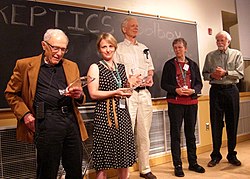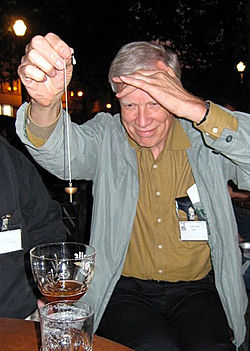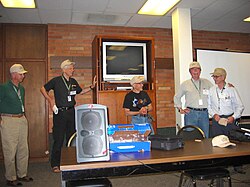James Alcock
James E. Alcock | |
|---|---|
 | |
| Born | December 24, 1942 (age 81) |
| Nationality | Canadian |
| Alma mater | McGill University BSc (Honours Physics) McMaster University PhD |
| Spouse | Karen Hanley |
| Awards | May 15, 2004 awarded CSICOP's In Praise of Reason Award |
| Scientific career | |
| Fields | Social Psychology, Practising Clinical Psychologist |
| Institutions | York University |
James E. Alcock (born 24 December 1942) is a Canadian educator. He has been a Professor of Psychology at York University (Canada) since 1973.[1] Alcock is a noted critic of parapsychology and is a Fellow and Member of the Executive Council for the Committee for Skeptical Inquiry.[2] He is a member of the Editorial Board of The Skeptical Inquirer,[3] and a frequent contributor to the magazine. He has also been a columnist for Humanist Perspectives Magazine.[4] In 1999, a panel of skeptics named him among the two dozen most outstanding skeptics of the 20th century.[5] In May 2004, CSICOP awarded Alcock CSI's highest honor, the In Praise of Reason Award.[6] Alcock is also an amateur magician and is a member of the International Brotherhood of Magicians.[7]

Career
James Alcock was chosen as a fellow of the Canadian Psychological Association for making "a distinguished contribution to the advancement of the science or profession of psychology".[9]
Skepticism
In his first television appearance in 1974, Alcock appeared on the TVOntario magazine show, The Education of Mike McManus, in Toronto. He sat on a panel discussing current paranormal research with a parapsychologist and a psychic healer. When asked if he was closed-minded to the possibility of psi, Alcock responded that there is no good research out there that would change his position. "The experiments that have been done... are filled with flaws... they just don't satisfy the canons of science. Until the parapsychologists can present evidence that satisfies the criteria of science there's nothing to investigate, there's no phenomenon there."[10]
"The pursuit of science should be directed at seeking explanations, whatever they are, rather than searching for preferred explanations. Parapsychology is directed at finding evidence that paranormal phenomena exist, rather than at explaining the strange, anomalous experiences that people have from time to time. Parapsychologists show little interest in normal explanations for those experiences because they are committed to finding evidence of the paranormal. Their commitment is such that failures to replicate, rather than suggesting that perhaps there is "nothing there" (the null hypothesis), the failures are reinterpreted in terms of some made-up "effect."[11]
In 1976, Alcock attended the organizing conference at which the Committee for the Scientific Investigation of Claims of the Paranormal was founded and was invited to be a Fellow of CSICOP at that time. He was appointed to the Executive Council a few years later.[11][12]
Alcock's 1981 book, "Parapsychology-Science Or Magic?: A Psychological Perspective," was instrumental in transforming Professor Chris French's skeptical understanding of paranormal events and explaining unusual experiences:
I kind of fell into this trap myself...I used to be a believer, a true believer until quite well into my adulthood. And it was reading one particular book by James Alcock, called 'Parapsychology-Science or Magic?' that made me realize there was another way of explaining all these unusual experiences, and one that actually made a lot of sense to me! ... I can turn 'round to him [James Alcock] and say, 'You are the bastard that got me to where I am today! You've got a lot to answer for![11][13]
A long–time member of the Skeptic's Toolbox faculty, Alcock lectures at the 4-day workshop that teaches attendees critical thinking skills for their daily lives. Alcock told a Register-Guard reporter who attended the 2003 conference, "Science has many voices... We encourage people to listen to scientific evidence, but how (in the case of expert testimony in American courts) do we determine who to listen to?" And in the case of printed media, "There are lots of things published that are sheer nonsense." Learning to evaluate evidence is why workshops like the Toolbox are important.[14]
In October 2004 Alcock spoke at the World Skeptics Congress in Italy.[3] As a member of the executive council of CFI, he addressed the opening session of the 2012 6th World Skeptic Congress in Berlin. He outlined the history of the modern skeptical movement as begun by CSICOP in April 1976 in Buffalo, NY.[15]
The San Francisco Chronicle asked Alcock to comment on EVP and ghost-hunter instruments. He suggested "several explanations for so-called voices from the dead. One theory is that the recording devices are picking up snatches of radio broadcasts. Another is called 'apophenia,' which means that people tend to perceive patterns even when there are none. If we play the same piece of tape over and over ... we maximize the opportunity for the perceptual apparatus in our brain to 'construct' voices that do not exist."[16]
Robert Jahn
In a systematic review carried out by Alcock of all parapsychological research involving random event generators, several important methodological problems became evident, and these problems were of such a serious nature that one could not have any confidence in the results and conclusions of the various studies. Much of that research was carried out in the Princeton University Anomalies Research (PEAR) laboratory of Robert Jahn, then Dean of that university's Engineering faculty. In addition to these serious methodological concerns, Alcock determined that if one were to remove the data related to one particular participant, the results of the study were no longer statistically significant. Moreover, the fact that the participant was the individual who set up and oversaw the research for Dr. Jahn naturally rang alarm bells.[17][18]

The null hypothesis
In 2003 Alcock published Give the Null Hypothesis a Chance: Reasons to Remain Doubtful about the Existence of Psi, where he claimed that parapsychologists never seem to take seriously the possibility that psi does not exist. Because of that, they interpret null results as indicating only that they were unable to observe psi in a particular experiment, rather than taking it as support for the possibility that there is no psi. The failure to take the null hypothesis as a serious alternative to their psi hypotheses leads them to rely upon a number of arbitrary "effects" to excuse failures to find predicted effects, excuse the lack of consistency in outcomes, and to excuse failures to replicate.
Basic endemic problems in parapsychological research include: insufficient definition of the subject matter, total reliance on negative definitions of their phenomena (e.g.- psi is said to occur only when all known normal influences are ruled out); failure to produce a single phenomenon that can be independently replicated by neutral researchers; the invention of "effects" such as the psi-experimenter effect to explain away inconsistencies in the data and failures to achieve predicted outcomes; unfalsifiability of claims; unpredictability of effects; lack of progress in more than a century of formal research; methodological weaknesses; reliance on statistical procedures to determine when psi has supposedly occurred, even though statistical analysis does not in itself justify a claim that psi has occurred; and failure to jibe with other areas of science. Overall, he argues that there is nothing in parapsychological research that would lead parapsychologists to conclude that psi does not exist, and so, even if it does not, the search is likely to continue for a long time. "I continue to believe that parapsychology is, at bottom, motivated by belief in search of data, rather than data in search of explanation."[19]

The Bem experiments
Media attention was directed toward Daryl Bem's research paper Feeling the Future: Experimental Evidence for Anomalous Retroactive Influences on Cognition and Affect. Alcock responded with his paper Back from the Future: Parapsychology and the Bem Affair by stating, "Bem has reported data suggesting that individuals' future experiences can influence their responses in the present. Careful scrutiny of his report reveals serious flaws in procedure and analysis, rendering this interpretation untenable."[20]
After evaluating Daryl Bem's nine experiments, Alcock claimed to have found metaphorical "dirty test tubes", serious methodological flaws such as changing the procedures partway through the experiments and combining results of tests with different chances of significance. The amount of actual tests done is unknown and no explanation of how it was determined that participants had "settled down" after seeing erotic images was given. Alcock concludes that almost everything that could go wrong with these separate experiments did go wrong. Bem's response to Alcock's critique appeared online at the Skeptical Inquirer website[21] and Alcock replied to these comments in a third article at the same website.[22]

Personal life
Married to Karen Hanley. Son Erik Alcock is a professional musician/songwriter; two of his songs were included on Eminem's Recovery album, the best-selling album of 2010.[23]

Quotes
- "We all have pockets of irrationality, and those pockets tend to be activated at times we're motivated by greed or fear."[24]
- Alcock interview in The LA Times states that the brain "is a complex data-processing system as subject to whim, memory and emotion as it is to reason." He equates it to "a machine that produces beliefs without any particular respect for what is real or true and what is not".[25]
- For The New York Times Alcock was asked why intelligent people believed in the paranormal, especially people in Hollywood. He responded "Most people are raised to live under two different belief systems: the rational, which governs most decisions in life, and the transcendental, which guides matters of spirituality and faith. Therefore for some people it is only a small leap to let their transcendental impulses creep into their daily affairs, especially when anxiety over career, finances or romance is involved. Faith, in whatever form it takes can provide great comfort, even a sense of empowerment. People who feel they have the stars on their side often feel an edge over mere mortals".[24]
- "Just because we apply a label does not mean we understand it; it hides ignorance."[11]
- "Many of our beliefs are created and shaped by what other people tell us, and so when we are misled, deliberately or not, we are left with beliefs that do not reflect reality. Worse, research shows that once we have come to believe something, the influence of that belief is not completely erased even if we later find out that it is distorted or false."[26]
Belief
Reviewed for Skeptical Inquirer Magazine fellow Toolbox facility Harriet Hall writes that Belief: What it Means to Believe and Why Our Convictions Are So Compelling is a 638 page expansion on Alcock's classic 1995 article "The Belief Engine" where he wrote "Our brains and nervous systems constitute a belief-generating machine, a system that evolved to assure not truth, logic, and reason, but survival". Hall quotes Ray Hyman's forward that this book is an "ideal textbook for a course that provides an integrated overview of all the areas of psychology" and that every "psychologist and psychology student should read it". Hall agrees, writing at the conclusion of her review, "I can't praise this book enough ... Our society would be a much better place if everyone would read this book and absorb its lessons".[27]
Selected publications
- Alcock, James (1990). Science and Supernature: A Critical Appraisal of Parapsychology. Prometheus Books. ISBN 0879755482.
- Alcock, James (2003). Psi Wars: Getting to Grips with the Paranormal. Imprint Academic. ISBN 0907845487.
- Alcock, James (2005). Parapsychology, Science or Magic?: A Psychological Perspective. Pergamon Press. ISBN 0080257739.
- Alcock, James; D.W. Carment; S.W. Sadava (2005). A Textbook of Social Psychology (6th ed.). Pearson Education Canada. ISBN 0-13-121741-0.
- Alcock, James; Sadava, Stan (2013). An Introduction to Social Psychology: Global Perspectives. Sage Publications.[28]
- Alcock, James (2018). BELIEF: What it Means to Believe and Why Our Convictions Are So Compelling. Prometheus Books. ISBN 978-1633884038.[29]
- "Electronic Voice Phenomena: Voices of the Dead?"
- "In Praise of Ray Hyman"
- "The Belief Engine"
References
- ^ "York University Faculty page". Archived from the original on July 6, 2011.
- ^ Frazier, Kendrick; Barry Karr (January–February 2011). "CSI (COP) Renews and Expands Executive Council, Plans for Future Activities". Skeptical Inquirer. 35 (1). Committee for Skeptical Inquiry: 5.
- ^ a b "World Skeptics Congress 2004: James Alcock". CICAP. Retrieved 29 July 2009.
- ^ "Index". Humanist Perspectives. Retrieved 21 August 2012.
- ^ "Skeptical Inquirer Names the Ten Outstanding Skeptics of the Century" (Press release). Skeptical Inquirer magazine. 14 December 1999. Retrieved 24 May 2012.
- ^ Caeddert, John (September–October 2004). "News and Comment". Skeptical Inquirer. 28 (5): 6.
- ^ "Skeptic Toolbox Interviews Pt 1". Retrieved 11 August 2012.
- ^ "Skeptic's Toolbox Awards - 2". Retrieved 12 August 2012.
- ^ "CPA Fellows". Canadian Psychological Association. Retrieved 10 June 2012.
- ^ "The Education of Mike McManus: Psychics & Parapsychology". TVOntario. Archived from the original on 16 April 2013. Retrieved 11 June 2012.
- ^ a b c d Gerbic, Susan. "James Alcock - an Interview with Susan Gerbic". Skeptical Inquirer. CSI. Retrieved 30 December 2017.
- ^ Ray Hyman - Honorary Degree Recipient, Vancouver, BC, Canada: Simon Fraser University, October 4, 2007, retrieved July 27, 2009
- ^ Saunders, Richard. "The Skeptic Zone #292 25 May 2014". The Skeptic Zone. Retrieved 6 June 2014.
- ^ Baker, Mark. "Skeptics gather to sort out normal and paranormal". August 17, 2003. The Register-Guard.
{{cite web}}: Missing or empty|url=(help) - ^ "A Brief History of the Skeptical Movement". World Skeptics Congress. Retrieved 25 May 2012.
- ^ Kirby, Carrie (31 October 2005). "Ghost hunters utilize latest in technology; paranormal research has become a popular pursuit". The San Francisco Chronicle. Retrieved 25 May 2012.
- ^ Psychic powers what are the odds? - 26 November 1994 - New Scientist
- ^ Alcock, James. "A comprehensive review of major empirical studies in parapsychology involving random event generators and remote viewing. In Commission on Behavioral and Social Sciences and Education, Enhancing human performance: Issues, theories and techniques, Background Papers.". National Academy Press. Retrieved 11 June 2012.
- ^ Alcock, James. "Give the Null Hypothesis a Chance: Reasons to Remain Doubtful about the Existence of Psi" (PDF). Archived from the original (PDF) on 10 August 2007. Retrieved 9 June 2012.
- ^ Alcock, James (6 January 2011). "Back from the Future: Parapsychology and the Bem Affair". CSICOP. Retrieved 9 June 2012.
- ^ Bem, Daryl (6 January 2011). "Response to Alcock's "Back from the Future: Comments on Bem"". Retrieved 31 January 2012.
- ^ Alcock, James (6 January 2011). "Response to Bem's Comments". Retrieved 31 January 2012.
- ^ "Eminem's 'Recovery' Is 2010's Best-Selling Album; Katy Perry's 'California Gurls' Top Digital Song". Billboard.com. 14 September 2009. Retrieved 27 November 2011.
- ^ a b Williams, Alex. "Hooked on Online Psychics". The New York Times. Retrieved 3 June 2012.
- ^ Dye, Lee (9 September 1996). "LA Times Archive". Retrieved 25 May 2012.
- ^ Gerbic, Susan. "The Challenge of Belief". Skeptical Inquirer. Retrieved 2 January 2019.
{{cite web}}: Cite has empty unknown parameter:|1=(help) - ^ Hall, Harriet (2018). "How We Believe". Skeptical Inquirer. 42 (6). Committee for Skeptical Inquirer: 56–59.
The brain can fool us with remarkable experiences that we can't distinguish from external reality, often accompanied by strong emotions and lasting effects.
- ^ http://www.sagepub.co.uk/alcocksadava. website for the textbook
- ^ "New and Notable". Skeptical Inquirer. 42 (3). Committee for Skeptical Inquiry: 60. 2018.
